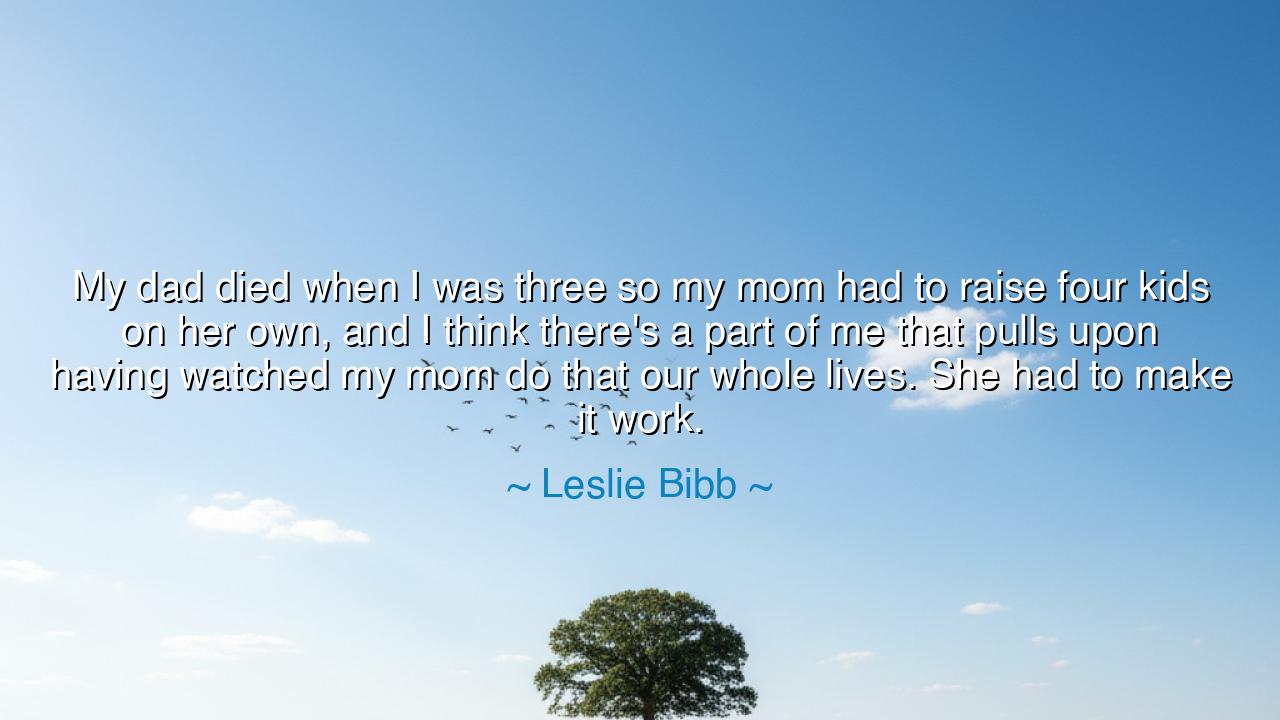
My dad died when I was three so my mom had to raise four kids on
My dad died when I was three so my mom had to raise four kids on her own, and I think there's a part of me that pulls upon having watched my mom do that our whole lives. She had to make it work.






The words “My dad died when I was three so my mom had to raise four kids on her own, and I think there's a part of me that pulls upon having watched my mom do that our whole lives. She had to make it work,” spoken by Leslie Bibb, resound with quiet strength — a testimony to the endurance of the human spirit and the unbreakable will of a mother’s love. Beneath the softness of her voice lies a story of survival and legacy: the inheritance not of wealth or comfort, but of resilience, courage, and devotion. In her reflection, one can hear the echo of ancient wisdom — that from struggle comes character, and from sacrifice, the birth of greatness.
When a father departs so early, whether by fate or misfortune, the balance of the household is shaken. The mother becomes both shield and sword, the dawn and the night, carrying the burdens of two souls within her single frame. The child who grows in such a home learns to see not only love but labor as love’s truest form — the long hours, the tears concealed behind smiles, the relentless will to “make it work.” This phrase, simple yet heroic, captures the essence of humanity’s oldest lesson: that the heart of a parent can defy even destiny itself.
Leslie Bibb’s words are not only a tribute to her mother but to every woman who has stood against the storm when life took away her shelter. Her mother’s strength became the compass by which she learned to navigate the world. In the silent heroism of her mother, she saw what it meant to endure without bitterness, to fight without fanfare, to love without condition. That image — of a woman refusing to break — rooted itself deep within her, shaping her sense of perseverance and compassion. It is no wonder that she says, “There’s a part of me that pulls upon that.” For the child of strength always carries within them the memory of survival, even if they never lived the struggle firsthand.
History, too, bears witness to countless such figures. Consider Abigail Adams, wife of John Adams, who managed a household and educated her children while her husband shaped a new nation. She wrote of tending the farm, raising the children, and keeping faith alive in her husband’s long absences. From her endurance came John Quincy Adams, a man who carried his mother’s fortitude into the presidency. Such stories are not merely historical; they are eternal, written into the rhythm of every generation. In Leslie Bibb’s mother, we see the same lineage — the sacred strength of women who, when the world gives them no choice, become both nurturer and warrior.
The deeper wisdom within this quote is that adversity becomes inheritance. A child who watches resilience learns resilience; a child who witnesses strength learns not to fear hardship. This is the alchemy of the human heart — the transformation of pain into purpose. The mother who “had to make it work” unknowingly taught her daughter the art of endurance, a lesson no school could teach. She modeled not perfection, but persistence. And persistence, as the ancients taught, is the highest virtue of all — for it is the root from which all others grow.
From this reflection flows a great teaching for those who listen: honor the strength that raised you. Many are tempted to forget the sacrifices that shaped their peace, yet wisdom demands remembrance. Whether it was a mother, father, or another guardian of your early days — carry their lessons forward. When you are weary, remember the ones who “had to make it work” without the luxury of rest. Let their memory be a torch that guides you through your own storms, reminding you that what was once endured for you must now be honored through your actions.
And so, in the spirit of Leslie Bibb’s words, we must understand that true greatness is often born from unseen struggle. The mother’s hands that stitched torn clothes and wiped away tears built a foundation stronger than any monument. The child who carries that example becomes not just a product of hardship, but a vessel of hope. When life demands that you stand alone, remember those who stood before you, unyielding and unbroken. Let their strength live through you — and in doing so, ensure that their sacrifices were not in vain. For as long as love endures, as long as courage is inherited, the world will always have those who “make it work.”






AAdministratorAdministrator
Welcome, honored guests. Please leave a comment, we will respond soon